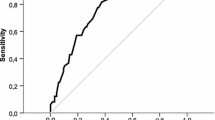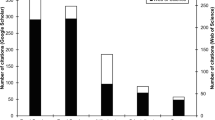Abstract
The aim of the study was to investigate the association between food craving and lifetime number of weight-loss attempts, as a proxy index of difficulties in weight-loss maintenance. The participants were 100 adult out-patients with BMI ≥ 25 admitted at three medical centers for the treatment of obesity and excess weight in Rome (Italy). The patients were administered the State and Trait Food Cravings Questionnaire, trait version (FCQ-T). The patients with five or more weight loss episodes (compared to those with four treatments or less) differed in all the dimensions of the FCQ-T. Food craving is associated with more difficulties in weight-loss maintenance after weight-loss interventions.
Similar content being viewed by others
References
Eckardt K, Taube A, Eckel J (2011) Obesity-associated insulin resistance in skeletal muscle: role of lipid accumulation and physical inactivity. Rev Endocr Metab Disord 12:163–172
Wing RR, Hill JO (2001) Successful weight loss maintenance. Annu Rev Nutr 21:323–341
Karhunen L, Lyly M, Lapvetelainen A, Kolehmainen M, Laaksonen DE, Lahteenmaki L, Poutanen K (2012) Psychobehavioural factors are more strongly associated with successful weight management than predetermined satiety effect or other characteristics of diet. J Obes 2012:274068
Wang GJ, Volkow ND, Logan J, Pappas NR, Wong CT, Zhu W, Netusil N, Fowler JS (2001) Brain dopamine and obesity. Lancet 357:354–357
Stice E, Yokum S, Blum K, Bohon C (2010) Weight gain is associated with reduced striatal response to palatable food. J Neurosci 30:13105–13109
Volkow ND, Wang GJ, Fowler JS, Tomasi D, Baler R (2011) Food and drug reward: overlapping circuits in human obesity and addiction. Curr Top Behav Neurosci 11:1–24
White MA, Whisenhunt BL, Williamson DA, Greenway FL, Netemeyer RG (2002) Development and validation of the food-craving inventory. Obes Res 10:107–114
von Deneen KM, Liu Y (2011) Obesity as an addiction: why do the obese eat more? Maturitas 68:342–345
Volkow ND, Wise RA (2005) How can drug addiction help us understand obesity? Nat Neurosci 8:555–560
Gearhardt AN, Yokum S, Orr PT, Stice E, Corbin WR, Brownell KD (2011) Neural correlates of food addiction. Arch Gen Psychiatry 68:808–816
Green MW, Rogers PJ, Elliman NA (2000) Dietary restraint and addictive behaviors: the generalizability of Tiffany’s cue reactivity model. Int J Eat Disord 27:419–427
Blum K, Braverman ER, Holder JM, Lubar JF, Monastra VJ, Miller D, Lubar JO, Chen TJ, Comings DE (2000) Reward deficiency syndrome: a biogenetic model for the diagnosis and treatment of impulsive, addictive, and compulsive behaviors. J Psychoactive Drugs 32(Suppl: i–iv):1–112
Franz MJ, VanWormer JJ, Crain AL, Boucher JL, Histon T, Caplan W, Bowman JD, Pronk NP (2007) Weight-loss outcomes: a systematic review and meta-analysis of weight-loss clinical trials with a minimum 1-year follow-up. J Am Diet Assoc 107:1755–1767
Svetkey LP, Stevens VJ, Brantley PJ, Appel LJ, Hollis JF, Loria CM, Vollmer WM, Gullion CM, Funk K, Smith P, Samuel-Hodge C, Myers V, Lien LF, Laferriere D, Kennedy B, Jerome GJ, Heinith F, Harsha DW, Evans P, Erlinger TP, Dalcin AT, Coughlin J, Charleston J, Champagne CM, Bauck A, Ard JD, Aicher K (2008) Comparison of strategies for sustaining weight loss: the weight loss maintenance randomized controlled trial. JAMA 299:1139–1148
Elfhag K, Rossner S (2005) Who succeeds in maintaining weight loss? A conceptual review of factors associated with weight loss maintenance and weight regain. Obes Rev 6:67–85
Odom J, Zalesin KC, Washington TL, Miller WW, Hakmeh B, Zaremba DL, Altattan M, Balasubramaniam M, Gibbs DS, Krause KR, Chengelis DL, Franklin BA, McCullough PA (2010) Behavioral predictors of weight regain after bariatric surgery. Obes Surg 20:349–356
Jakicic JM (2009) The effect of physical activity on body weight. Obesity 17(Suppl 3):S34–S38
Pepino MY, Finkbeiner S, Mennella JA (2009) Similarities in food cravings and mood states between obese women and women who smoke tobacco. Obesity 17:1158–1163
Fabbricatore M, Imperatori C, Morgia A, Contardi A, Tamburello S, Tamburello A, Innamorati M (2011) Food craving and personality dimensions in overweight and obese patients attending low energy diet therapy. Obe Metab 7:e28–e34
Moreno S, Rodriguez S, Fernandez MC, Tamez J, Cepeda-Benito A (2008) Clinical validation of the trait and state versions of the Food Craving Questionnaire. Assessment 15:375–387
White MA, Grilo CM (2005) Psychometric properties of the Food Craving Inventory among obese patients with binge eating disorder. Eat Behav 6:239–245
Fabbricatore M, Imperatori C, Pecchioli C, Micarelli T, Contardi A, Tamburello S, Innamorati M, Tamburello A (2011) Binge eating and BIS/BAS activity in obese patients with intense food craving who attend weight control programs. Obe Metab 7:e21–e27
Jarosz PA, Dobal MT, Wilson FL, Schram CA (2007) Disordered eating and food cravings among urban obese African American women. Eat Behav 8:374–381
Vander Wal JS, Johnston KA, Dhurandhar NV (2007) Psychometric properties of the State and Trait Food Cravings Questionnaires among overweight and obese persons. Eat Behav 8:211–223
Wing RR, Phelan S (2005) Long-term weight loss maintenance. Am J Clin Nutr 82:222S–225S
Cepeda-Benito A, Gleaves DH, Fernandez MC, Vila J, Williams TL, Reynoso J (2000) The development and validation of Spanish versions of the State and Trait Food Cravings Questionnaires. Behav Res Ther 38:1125–1138
Cepeda-Benito A, Fernandez MC, Moreno S (2003) Relationship of gender and eating disorder symptoms to reported cravings for food: construct validation of state and trait craving questionnaires in Spanish. Appetite 40:47–54
Marlatt GA, Gordon JR (1985) Relapse prevention: maintenance strategies in the treatment of addictive behaviors. Guilford Press, New York
Kaplan GB, Heinrichs SC, Carey RJ (2011) Treatment of addiction and anxiety using extinction approaches: neural mechanisms and their treatment implications. Pharmacol Biochem Behav 97:619–625
Wise RA (2009) Roles for nigrostriatal—not just mesocorticolimbic—dopamine in reward and addiction. Trends Neurosci 32:517–524
Hogarth L (2011) The role of impulsivity in the aetiology of drug dependence: reward sensitivity versus automaticity. Psychopharmacology 215:567–580
Penas-Lledo EM, Loeb KL, Martin L, Fan J (2007) Anterior cingulate activity in bulimia nervosa: a fMRI case study. Eat Weight Disord 12:e78–e82
Mathes WF, Brownley KA, Mo X, Bulik CM (2009) The biology of binge eating. Appetite 52:545–553
Volkow ND, Wang GJ, Fowler JS, Tomasi D, Telang F (2011) Quantification of behavior sackler colloquium: addiction: beyond dopamine reward circuitry. Proc Natl Acad Sci USA 108:15037–15042
Coelho JS, Polivy J, Herman CP (2006) Selective carbohydrate or protein restriction: effects on subsequent food intake and cravings. Appetite 47:352–360
Martin CK, O’Neil PM, Tollefson G, Greenway FL, White MA (2008) The association between food cravings and consumption of specific foods in a laboratory taste test. Appetite 51:324–326
Meule A, Lutz A, Vogele C, Kubler A (2012) Food cravings discriminate differentially between successful and unsuccessful dieters and non-dieters. Validation of the Food Cravings Questionnaires in German. Appetite 58:88–97
Budak AR, Thomas SE (2009) Food craving as a predictor of “relapse” in the bariatric surgery population: a review with suggestions. Bariatric Nursing and Surgical Patient Care 4:115–121
Goldman RL, Borckardt JJ, Frohman HA, O’Neil PM, Madan A, Campbell LK, Budak A, George MS (2011) Prefrontal cortex transcranial direct current stimulation (tDCS) temporarily reduces food cravings and increases the self-reported ability to resist food in adults with frequent food craving. Appetite 56:741–746
Alberts HJ, Mulkens S, Smeets M, Thewissen R (2010) Coping with food cravings. Investigating the potential of a mindfulness-based intervention. Appetite 55:160–163
Conflict of interest
None.
Author information
Authors and Affiliations
Corresponding author
About this article
Cite this article
Fabbricatore, M., Imperatori, C., Contardi, A. et al. Food craving is associated with multiple weight loss attempts. Mediterr J Nutr Metab 6, 79–83 (2013). https://doi.org/10.1007/s12349-012-0115-x
Received:
Accepted:
Published:
Issue Date:
DOI: https://doi.org/10.1007/s12349-012-0115-x




